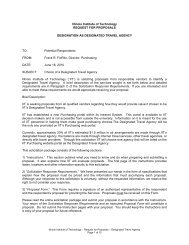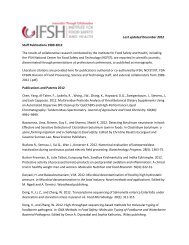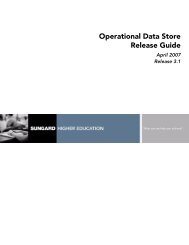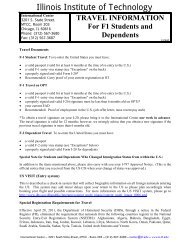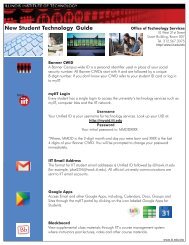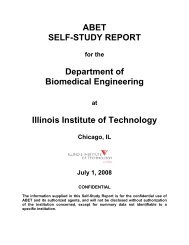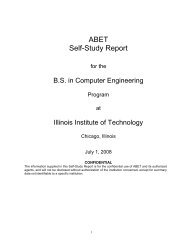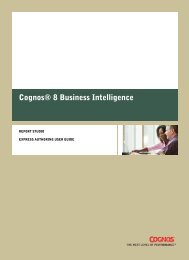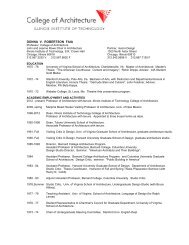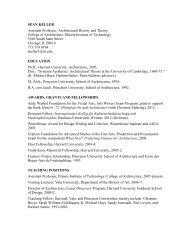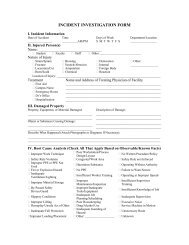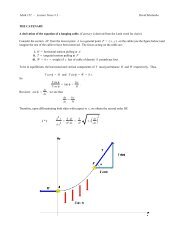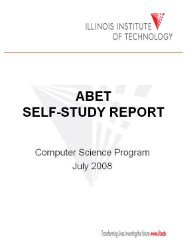Undergraduate Bulletin - Illinois Institute of Technology
Undergraduate Bulletin - Illinois Institute of Technology
Undergraduate Bulletin - Illinois Institute of Technology
You also want an ePaper? Increase the reach of your titles
YUMPU automatically turns print PDFs into web optimized ePapers that Google loves.
Course Descriptions<br />
CS 480<br />
Artificial Intelligence Planning & Control<br />
Introduction to computational methods for intelligent control<br />
<strong>of</strong> autonomous agents, and the use <strong>of</strong> programming paradigms<br />
that support development <strong>of</strong> flexible and reactive systems.<br />
These include heuristic search, knowledge representation,<br />
constraint satisfaction, probabilistic reasoning, decisiontheoretic<br />
control, and sensor interpretation. Particular focus<br />
will be places on real-world application <strong>of</strong> the material.<br />
Prerequisite(s): [(CS 331) OR (CS 401) OR (CS 403)] AND<br />
[(MATH 474*)] An asterisk (*) designates a course which<br />
may be taken concurrently.<br />
(3-0-3) (T)<br />
CS 481<br />
Artificial Intelligence Language Understanding<br />
Theory and programming paradigms that enable systems<br />
to understand human language texts and extract useful<br />
information and knowledge. For example, extraction <strong>of</strong> structured<br />
event representations from news stories or discovering<br />
new research hypotheses by analyzing thousands <strong>of</strong> medical<br />
research articles. the course covers a variety <strong>of</strong> text analysis<br />
and text mining methods, with an emphasis on building<br />
working systems. Connections to information retrieval, data<br />
mining, and speech recognition will be discussed.<br />
Prerequisite(s): [(CS 331) OR (CS 401) OR (CS 403)] AND<br />
[(MATH 474)]<br />
(3-0-3) (T)<br />
CS 482<br />
Information & Knowledge Management Systems<br />
This capstone course is designed as a project course whose<br />
purpose is to enable students to see how the various algorithms<br />
and systems they have learned about in their<br />
prerequisite courses can be used in context to create useful<br />
knowledge management tools. Class periods will be divided<br />
among discussion <strong>of</strong> design <strong>of</strong> information and knowledge<br />
management systems, lectures on effective project management<br />
techniques, and hands-on advising <strong>of</strong> student project<br />
group meetings.<br />
Prerequisite(s): [(CS 422, CS 425, and CS 429) OR (CS 422,<br />
CS 425, and CS 481) OR (CS 425, CS 429, and CS 481)]<br />
(3-0-3) (C)(T)<br />
CS 485<br />
Computers & Society<br />
Discussion <strong>of</strong> the impact <strong>of</strong> computer technology on present<br />
and future society. Historical development <strong>of</strong> the computer.<br />
Social issues raised by cybernetics.<br />
Prerequisite(s): [(COM 421) OR (COM 428)]<br />
(3-0-3) (C)<br />
CS 487<br />
S<strong>of</strong>tware Engineering I<br />
Study <strong>of</strong> the principles and practices <strong>of</strong> s<strong>of</strong>tware engineering.<br />
Topics include s<strong>of</strong>tware quality concepts, process models,<br />
s<strong>of</strong>tware requirements analysis, design methodologies, s<strong>of</strong>tware<br />
testing and s<strong>of</strong>tware maintenance. Hands-on experience<br />
building a s<strong>of</strong>tware system using the waterfall life cycle model.<br />
Students work in teams to develop all life cycle deliverables:<br />
requirements document, specification and design documents,<br />
system code, test plan, and user manuals.<br />
Prerequisite(s): [(CS 331) OR (CS 401) OR (CS 403)] AND<br />
[(CS 425)]<br />
(3-0-3) (C)(T)<br />
CS 491<br />
<strong>Undergraduate</strong> Research<br />
<strong>Undergraduate</strong> Research<br />
(Credit: Variable)<br />
CS 495<br />
Topics in Computer Science<br />
This course will treat a specific topic, varying from semester<br />
to semester, in which there is particular student or staff<br />
interest.<br />
(Credit: Variable)<br />
CS 497<br />
Special Projects<br />
Special projects.<br />
(Credit: Variable)<br />
GRADUATE COURSES<br />
Degree-seeking undergraduates may take graduate courses with<br />
approval <strong>of</strong> the course instructor and faculty advisor. For course<br />
descriptions, see the IIT <strong>Bulletin</strong>: Graduate Programs.<br />
CS 511<br />
Topics in Computer Graphics<br />
CS 512<br />
Topics in Computer Vision<br />
CS 520<br />
Database Design and Engineering<br />
CS 521<br />
Object-Oriented Analysis and Design<br />
CS 522<br />
Data Mining<br />
CS 525<br />
Advanced Database Organization<br />
CS 529<br />
Information Retrieval<br />
CS 530<br />
Theory <strong>of</strong> Computation<br />
CS 531<br />
Topics in Automata Theory<br />
CS 533<br />
Computational Geometry<br />
CS 535<br />
Design and Analysis <strong>of</strong> Algorithms<br />
CS 536<br />
Science <strong>of</strong> Programming<br />
CS 537<br />
S<strong>of</strong>tware Metrics<br />
CS 538<br />
Combinatorial Optimization<br />
CS 540<br />
Syntactic Analysis <strong>of</strong> Programming Languages<br />
CS 541<br />
Topics in Compiler Construction<br />
CS 542<br />
Computer Networks I Fundamentals<br />
CS 544<br />
Computer Networks II: Network Services<br />
CS 545<br />
Distributed Computing Landscape<br />
212



